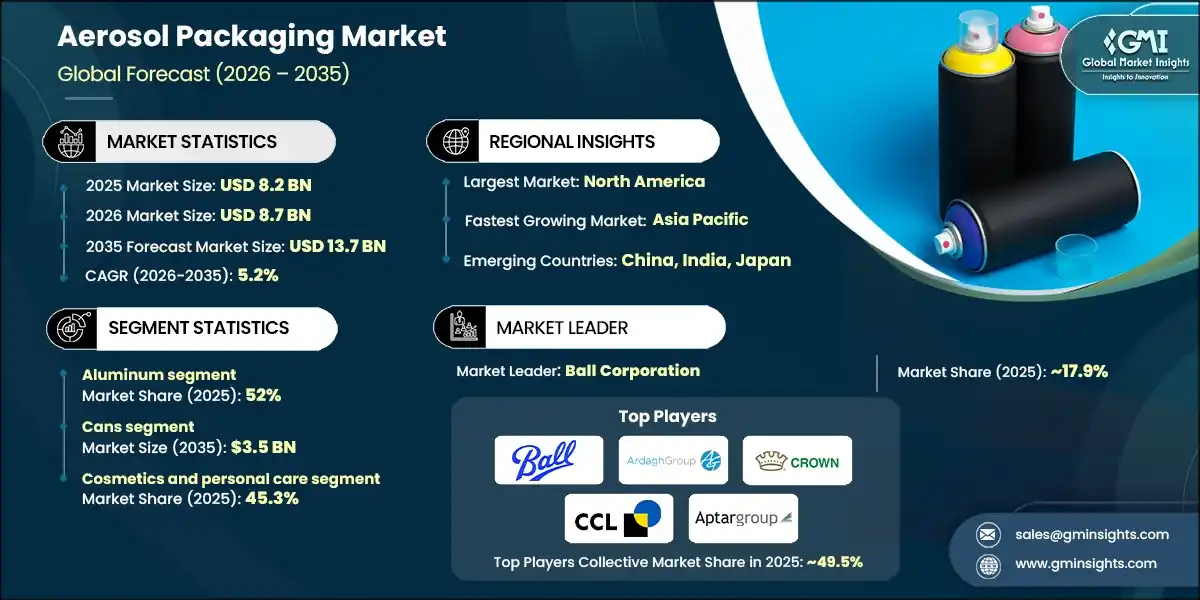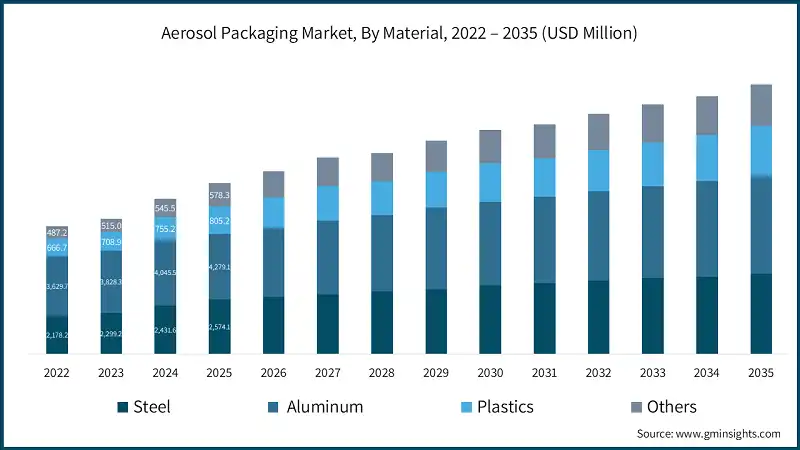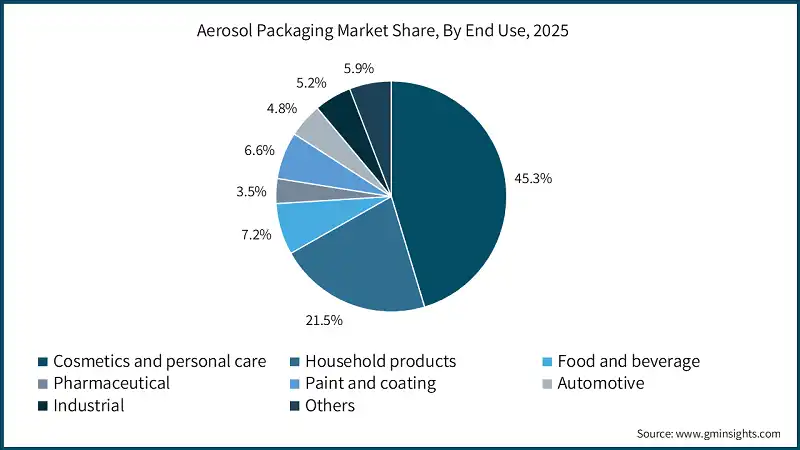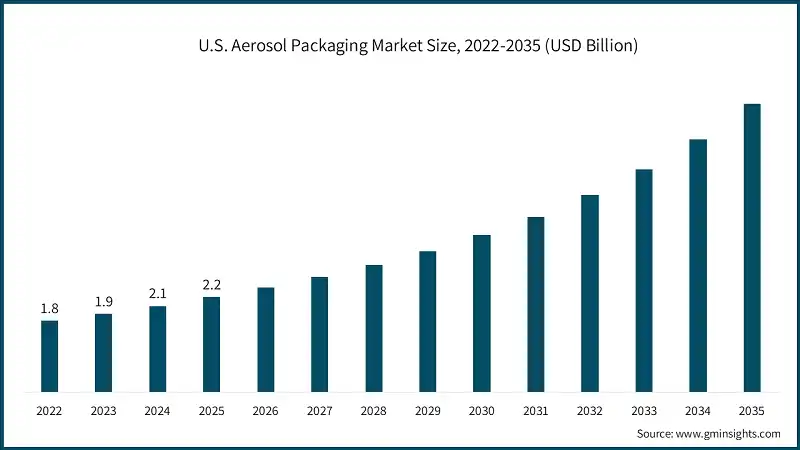Summary
Table of Content

Aerosol Packaging Market
Get a free sample of this report
Form submitted successfully!
Error submitting form. Please try again.
Thank you!
Your inquiry has been received. Our team will reach out to you with the required details via email. To ensure that you don't miss their response, kindly remember to check your spam folder as well!

Request Sectional Data
Thank you!
Your inquiry has been received. Our team will reach out to you with the required details via email. To ensure that you don't miss their response, kindly remember to check your spam folder as well!
Form submitted successfully!
Error submitting form. Please try again.
Aerosol Packaging Market Size
The global aerosol packaging market was valued at USD 8.2 billion in 2025. The market is expected to grow from USD 8.7 billion in 2026 to USD 11.3 billion in 2031 & USD 13.7 billion in 2035, at a value CAGR of 5.2% during the forecast period according to the latest report published by Global Market Insights Inc.

To get key market trends
The growth of personal care products, rising adoption in household products, innovation in packaging technology, increased focus on convenience and portability, expansion of the E-commerce sector propels market growth.
A key factor contributing to the ongoing growth of the aerosol packaging industry is the increasing demand from consumers for premium or high-quality personal care products. Because of this increased consumer preference for high-quality items, manufacturers have turned to aerosols as an efficient delivery method for their products. The India Brand Equity Foundation (December 2023) states that the Indian cosmetic market is expected to reach USD 20 billion by 2025. This rapid growth demonstrated a growing rate of occurrence of the use of aerosol packaging for the convenience and efficient delivery of personal care products in the region.
The rapid expansion of the e-commerce market also benefits the aerosol packaging industry, as online shopping creates a greater level of product visibility and generates the demand for greater levels of convenience through shipping. In Q2 2025, U.S. retail e-commerce sales totaled USD 304.2 billion, representing a 5.3% increase from the previous year, and accounted for 16.3% of the total retail market, according to the U.S. Census Bureau. This increase in e-commerce activity will further support the increasing demand for lightweight and user-friendly packaging solutions, specifically aerosol containers, to provide consumers with maximum convenience and portability.
Between 2022 and 2024, the market witnessed considerable growth, increasing from USD 7 billion in 2022 to USD 7.8 billion in 2024. Improvements in aerosol package design are creating greater function and appeal for the consumer. New materials will include recyclable and biodegradable cans, an improved aerosol valve for accurate dispensing, and other features like tamper-evident seals and child-resistant designs. In January 2024, a partnership was formed between Salvalco and Procter & Gamble (P&G) to incorporate Salvalco's Eco-Valve technology into Old Spice with the launch of an aluminum-free body spray labelled as a nitro spray.
Aerosol Packaging Market Report Attributes
| Key Takeaway | Details |
|---|---|
| Market Size & Growth | |
| Base Year | 2025 |
| Market Size in 2025 | USD 8.2 Billion |
| Market Size in 2026 | USD 8.7 Billion |
| Forecast Period 2026 - 2035 CAGR | 5.2% |
| Market Size in 2035 | USD 13.7 Billion |
| Key Market Trends | |
| Drivers | Impact |
| Growing Demand for Personal Care Products | Drives 22% growth as consumers increasingly seek premium, convenience, and high-quality personal care products, boosting the adoption of aerosol packaging. |
| Rising Adoption in Household Products | Contributes 19% growth with higher demand for easy-to-use, portable aerosol packaging solutions in household cleaning, pest control, and air fresheners. |
| Innovation in Packaging Technology | Fuels 17% growth by advancing eco-friendly, sustainable aerosol packaging solutions, appealing to environmentally conscious consumers and industries. |
| Increased Focus on Convenience and Portability | Adds 18% growth as aerosol packaging portability and ease of use align with consumer demand for on-the-go solutions in personal care and household products. |
| Expansion of the E-Commerce Sector | Contributes 24% growth driven by the rise in online shopping, which demands efficient, lightweight, and easy-to-ship aerosol packaging for various product categories. |
| Pitfalls & Challenges | Impact |
| Environmental Concerns | Limiting 22% of market growth as increased focus on reducing environmental impact forces the aerosol packaging industry to find eco-friendly alternatives, impacting traditional materials. |
| Regulatory Restrictions | Restrains 19% of market growth due to growing regulations aimed at reducing the use of harmful chemicals and non-recyclable materials in aerosol packaging, prompting innovation and compliance challenges. |
| Opportunities: | Impact |
| Sustainable Packaging Solutions | Growing consumer demand for eco-friendly products creates an opportunity for aerosol packaging to adopt recyclable and biodegradable materials, aligning sustainability goals and enhancing brand reputation. |
| Integration of Smart Packaging | Incorporating smart technologies such as RFID and QR codes in aerosol packaging enhances product traceability, improves user experience, and supports consumer engagement with real-time information. |
| Market Leaders (2025) | |
| Market Leaders |
~ 17.9% market share. |
| Top Players |
|
| Competitive Edge |
|
| Regional Insights | |
| Largest Market | North America |
| Fastest growing market | Asia Pacific |
| Emerging countries | China, India, Japan |
| Future outlook |
|
What are the growth opportunities in this market?
Aerosol Packaging Market Trends
- Increasing concerns about misuse of aerosol products, as well as the protection of the integrity of the products, have led to increased safety expectations from consumers and stricter regulations for household and personal care products.
- The U.S. consumer product safety commission (CPSC) requires packaging to meet child-resistant standards for any product intended for use by children under age 5 years and yet remain easy to open by adult caregivers. Thus, the implementation of these trends provides an important benefit to consumers.
- A growing trend among manufacturers in the aerosol packaging industry is to develop environmentally friendly products, with 2023 seeing significant shifts towards recycling and reusing the products supplied and distributed by many manufacturers. Manufacturers' efforts to monetize the shift towards sustainable aerosol packaging through the adoption of recycled aluminum, new plant-based materials, improved propellant methods and improved recycling methods also demonstrate their commitment to providing sustainable products.
- An example of this initiative is Beiersdorf's press release dated 2023, in which it announced making aerosol cans for its NIVEA brand and others from 50% recycled aluminum and to produce the aerosol cans at 11.6% less weight than currently being manufactured. Beiersdorf estimates this will reduce the CO2 emissions from the aerosol can supply chain by 58% and eliminate around 30 metric tons of CO2 every year.
- The use of aerosol propellants in aerosol products is a growing concern. As a result, the market for propellant-free aerosol systems has increased. Propellant-free systems use pumps and manual compression to create a propellant-free aerosol product without emitting greenhouse gases (GHG) that would otherwise be associated with traditional pressurized aerosol cans. An example of an innovative propellant-less aerosol is the example from APS with the twist Mist product announced June 2023. This product uses twist to activate, dispense continuously, and could be made of recyclable materials such as HDPE, PET, metal, or glass for its packaging.
Aerosol Packaging Market Analysis

Learn more about the key segments shaping this market
The global market was valued at USD 7 billion and USD 7.3 billion in 2022 and 2023, respectively. The market size reached USD 8.2 billion in 2025, growing from USD 7.8 billion in 2024.
Based on the material, the global aerosol packaging market is divided into steel, aluminum, plastic, & others.
- The aluminum segment accounted for 52% of the market in 2025 due to their lightness, long-lasting properties against corrosion, many ways to recycle them, and due to consumers becoming more environmentally conscious towards sustainable products, the aluminum portion of this market experiencing large growth.
- To meet the increasing demand of eco-conscious consumers, manufacturers in this area must focus on utilizing as much recycled aluminum as possible, improving their sustainability practices, increasing their production efficiencies, and using aluminum in lightweight packaging.
- The steel segment was valued at USD 2.6 billion in 2025 and is anticipated to grow at a CAGR of 5.2% over the forecast years. Due to the strength and durability of steel along with the ability to protect contents, steel segments continue to see large growth in this area's market share.
- Manufacturers must be completely focused on increasing the recyclability of steel, decreasing costs along with improving durability and increasing the usage of green production processes due to the growing demand for sustainability in packaging products.
Based on product type, the aerosol packaging market is segmented into cans, bottles & cylinder, jars, & others. The cans segment dominated the market in 2025 with a revenue of USD 3.5 billion.
- The durability, recyclable properties, lightweight design, and protective barrier drive market growth. These features ensure product safety, extended shelf life, and alignment with sustainability goals, making cans a preferred packaging choice.
- To meet the increasing demand for eco-friendly packaging, manufacturers must focus on improving the durability, recyclability, and sustainability of the cans they make. They can do this by developing new and innovative materials.
- On the other hand, the bottles & cylinder segment is expected to witness growth at a CAGR of 5.2% during the forecast period.
- The convenience, portability, easy dispensing, and the trend toward reusable packaging are driving the growth of the bottles & cylinder segment.
- Manufacturers must create lightweight, durable bottles from sustainable materials and focus on enhancing the recyclability of the bottle product while addressing consumer needs for convenience and functionality while also offering eco-friendly packaging solutions.

Learn more about the key segments shaping this market
Based on the end use, aerosol packaging market is classified into cosmetics and personal care, household products, food and beverage, pharmaceutical, paint and coating, automotive, industrial, & others. Cosmetics and personal care dominated the market in 2025 with a market share of 45.3%.
- Cosmetics/personal care continue to see growth driven by the rising consumer demand for advanced, eco-friendly sustainable packaging of skincare, haircare and personal grooming products.
- Manufacturers in this segment must focus on the development of packaging solutions that incorporate sustainability, the latest innovative technology and convenience for consumers to meet the growing demand for personal care packaging.
- The food/beverage segment is expected to witness growth at a CAGR of 4.9% during the forecast period. The food/beverage category is growing due to increased convenience of products along with the need for controlling product portions along with increased demand for easy-to-use, environmentally friendly, aerosol packaging solutions.
- Manufacturers continue to pursue providing consumers with more convenience, keeping products fresh, and being more environmentally friendly with food/beverage products.

Looking for region specific data?
North America Aerosol Packaging Market
North America dominates the market with a market share of 31.2% in 2025.
- The North American aerosol packaging industry has been shaped by several factors such as strong regulations governing compliance, an ever-expanding number of consumers interested in sustainability issues, as well as advances in technology which provide more effective methods of producing aerosols than previously possible.
- The increase in growth and demand for personal care and cleaning products sold through aerosol packaging also contributes to the overall growth of the North American aerosol packaging industry.
The U.S. aerosol packaging market was valued at USD 1.8 billion and USD 1.9 billion in 2022 and 2023, respectively. The market size reached USD 2.2 billion in 2025, growing from USD 2.1 billion in 2024.
- The growing market for aerosol packaging in the U.S. attributed to as an increasing focus on sustainability, growing consumer awareness of environmentally friendly products, improvements in the technologies used to make these products and the continued growth of the market for personal care and household cleaning products.
- Manufacturers should emphasize the need to include sustainable packaging options, to use propellant-free forms of aerosol packaging, to adhere to all of the stringent environmental regulations, and develop more innovative forms of recyclable materials used in the packaging of their products.
Europe Aerosol Packaging Market
Europe market accounted for USD 2.2 billion in 2025 and is anticipated to show lucrative growth over the forecast period.
- The following factors that drive the growth of the European aerosol packaging industry are strict EU environmental regulations, increasing consumer demand for environmentally friendly products, and an increased awareness of the need to reduce carbon footprints and promote sustainable practices.
- Another important driver of the European market is the growing demand for sustainable beauty products and an increased emphasis on sustainable practices including recycling and the maximization of resource efficiency.
Germany dominates the Europe aerosol packaging market, showcasing strong growth potential.
- Due to stricter regulations and increasing emphasis on renewable energy sources, the German aerosol packaging industry is largely dependent on these two factors in addition to strong consumer preference for more environmentally friendly and sustainable forms of packaging.
- To meet the growing expectations of consumers for environmentally sustainable products, manufacturers in Germany must concentrate their efforts on complying with packaging waste regulations, using renewable energy in their production processes, and developing sustainable and recyclable packaging solutions.
Asia Pacific Aerosol Packaging Market
The Asia Pacific market is anticipated to grow at the highest CAGR of 5.7% during the analysis timeframe.
- The increasing rate of urbanization and population growth in the Asia-Pacific Region along with increased disposable income in emerging market countries leading to the increasing demand for personal care products is driving packaging innovation in the Asia-Pacific region’s market.
- Additionally, Government initiatives in support of sustainable packages, the growth of E-commerce and online retail, all contribute positively to the growth of this market.
China aerosol packaging market is estimated to grow with a significant CAGR, in the Asia Pacific market.
- The growth of China's aerosol packaging industry has been influenced by the booming domestic beauty product industry, growing environmental awareness among Chinese consumers, and increased popularity of health and hygiene (H&H) products in China.
- Chinese manufacturers of aerosol packaging should place the emphasis on the development of eco-friendly packaging products using the development of sustainable materials (both manufacturing and raw material), on the meeting of increased demand for beauty and H&H products, and on compliance with environmental regulation.
Latin American Aerosol Packaging Market
Brazil leads the Latin American market, exhibiting remarkable growth during the analysis period.
- Brazil is the leading market in Latin America for aerosol packaging due to the growing interest in beauty trends, increased demand for cleaning products, and stringent waste recycling legislation in Brazil.
- Manufacturers of aerosol packaging should concentrate on producing sustainable packaging solutions for both beauty and cleaning products, thereby being compliant with their country’s recycling legislation and in compliance with the growing demand for eco-friendly products by consumers.
Middle East and Africa Aerosol Packaging Market
South Africa aerosol packaging industry to experience substantial growth in the Middle East and Africa market in 2025.
- In the Middle East and Africa region, South Africa's market is driven by increasing demand for personal care products, urbanization, and growing sustainability awareness.
- Manufacturers in South Africa should focus on creating sustainable, recyclable aerosol packaging, meeting growing demand for personal care products, and adhering to environmental regulations to enhance market competitiveness.
Aerosol Packaging Market Share
The major manufacturers of aerosol packaging, which represent approximately 49.5% of the aerosol packaging market share by 2025, include Ball Corporation, The Ardagh Group S.A., Crown Holdings, Inc., CCL Industries, Inc., and AptarGroup, Inc. These companies are all significant contributors to aerosol packaging growth via their innovative and environmentally conscious packaging solutions. Each company has a global presence, focusing on utilizing eco-friendly production processes and advanced technology in the manufacturing of aerosol products in the personal care, food, and pharmaceutical markets.
Small niche players are entering the aerosol packaging market by creating a variety of innovations. By developing new and innovative products that specifically cater to the consumer’s unique individual preferences, smaller businesses are successfully competing with larger aerosol manufacturers.
Aerosol Packaging Market Companies
Prominent players operating in the aerosol packaging industry are as mentioned below:
- Aero-Pack Industries, Inc.
- Aryum Metal
- Ardagh Group S.A.
- Ball Corporation
- Berry Global, Inc.
- CANPACK
- Casablanca Industries Pvt Ltd
- CCL Industries, Inc.
- Colep Portugal S.A.
- Coster Group
- Crown Holdings, Inc.
- Favor ltd.
- Graham Packaging
- Henkel AG & Co. KGaA
- Lindal Group Holding GmbH
- Linhardt GmbH & Co KG
- Mitani Valve Co. Ltd.
- MJS Packaging
- Montebello Packaging, Inc.
- Nampak Limited
- Perfektup Ambalaj
- Plastipak Holdings, Inc
- Precision Valve Corporation
- Summit Packaging Systems
- Trivium Packaging
- TUBEX GmbH.
- Ball Corporation
Ball Corporation's leadership position in the aerosol packaging segment results from its innovative, sustainable packaging, strong emphasis on recycling, advanced technology, and extensive worldwide distribution systems that address growing consumer demand for environmentally friendly, durable packaging.
The Ardagh Group S.A.'s dominance in the aerosol market comes from its innovative packaging that includes sustainable solutions, its wide variety of products, its commitment to recyclability, and its global reach, and therefore it can provide an extensive range of high-quality products for different sectors of the economy.
CCL Group based on their superior manufacturing capabilities in addition to their focus on sustainability through innovative packaging solutions and worldwide distribution, which enables them to provide customers with high-quality environmentally friendly packaging.
- Crown Holdings, Inc.
Crown Holdings is positioned to lead the aerosol packaging industry due to commitment to meeting the needs of its customers through innovative and sustainable packaging solutions, and its global distribution capabilities offering a competitive advantage by providing customers with high-quality environmentally friendly products. - AptarGroup, Inc.
AptarGroup, Inc.'s position in the aerosol market is as a market leader because of its commitment to innovate through providing dispensing solutions and sustainable solutions and cutting-edge technologies, its strength derives from the partnerships it forms with other manufacturers and suppliers in the personal care, food, and pharmaceutical industries.
Aerosol Packaging Industry News
- In September 2025, Ball collaborated with Brazilian brands Soffie and Aeroflex to launch the world’s first ASI-certified aluminum aerosol cans, featuring the aluminum stewardship initiative seal, highlighting sustainability and brand transparency in products like RUN deodorants.
- In June 2024, Aptar Beauty introduced Maya, a new customizable aerosol actuator designed to improve consumer experience and enhance sustainability through the creation of a customizable spray actuator for increased shelf presence and consumer engagement.
- In June 2023, Berry Global introduced a spray-through top made from 50% recycled material, which is a member of the Bmore circular solutions family reinforcing the company's focus on providing eco-friendly packaging solutions in many market segments.
The aerosol packaging market research report includes in-depth coverage of the industry with estimates and forecast in terms of revenue in USD Million & volume in Units from 2022 – 2035 for the following segments:
Market, By Product Type
- Cans
- Bottles & cylinder
- Jars
- Others
Market, By Material
- Steel
- Aluminum
- Plastic
- Others
Market, By End Use
- Cosmetics and personal care
- Household products
- Food and beverages
- Pharmaceutical
- Paint and coating
- Automotive
- Industrial
- Others
The above information is provided for the following regions and countries:
- North America
- U.S.
- Canada
- Europe
- Germany
- UK
- France
- Spain
- Italy
- Netherlands
- Asia Pacific
- China
- India
- Japan
- Australia
- South Korea
- Latin America
- Brazil
- Mexico
- Argentina
- Middle East and Africa
- South Africa
- Saudi Arabia
- UAE
Frequently Asked Question(FAQ) :
What is the growth outlook for the cosmetics and personal care end-use segment?
The cosmetics and personal care segment held a 45.3% market share in 2025. Growth is driven by increasing consumer demand for premium grooming products, convenience packaging, and sustainable aerosol delivery systems.
Which region leads the aerosol packaging market?
North America led the market with a market share of 31.2% in 2025. Its dominance is supported by strong regulatory frameworks, high consumer awareness of sustainability, and robust demand for personal care and household aerosol products.
What are the upcoming trends in the aerosol packaging industry?
Key trends include development of propellant-free aerosol systems, increased use of recycled and lightweight materials, smart packaging integration, child-resistant designs, and rising adoption of eco-friendly and sustainable aerosol packaging solutions.
What is the projected value of the aerosol packaging market by 2035?
The market size for aerosol packaging is expected to reach USD 13.7 billion by 2035, growing at a CAGR of 5.2% from 2026 to 2035. Growth is fueled by sustainable packaging initiatives, recyclable materials adoption, and rising demand for premium consumer products.
What was the market size of the cans product segment in 2025?
The cans segment dominated the market with revenue of USD 3.5 billion in 2025. Strong durability, protective barriers, extended shelf life, and recyclability support widespread adoption across personal care and household applications.
How much revenue did the aluminum material segment generate in 2025?
The aluminum segment accounted for approximately 52% of the market in 2025, making it the leading material category. Its dominance is driven by lightweight properties, corrosion resistance, high recyclability, and alignment with sustainability goals.
What is the market size of the aerosol packaging industry in 2026?
The aerosol packaging market reached USD 8.7 billion in 2026, reflecting steady expansion driven by e-commerce growth, packaging innovation, and increasing adoption across personal care and household product categories.
What is the aerosol packaging market size in 2025?
The global market size for aerosol packaging is valued at USD 8.2 billion in 2025. Market growth is supported by rising demand for personal care products, increased use in household applications, and growing preference for convenient and portable packaging solutions.
Who are the key players in the aerosol packaging market?
Key players include Ball Corporation, Ardagh Group S.A., Crown Holdings, Inc., CCL Industries, Inc., and AptarGroup, Inc. These companies focus on innovation, sustainable materials, advanced dispensing technologies, and global expansion to strengthen their market positions.
Aerosol Packaging Market Scope
Related Reports


